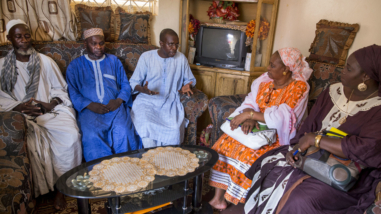College of William & Mary
For Geospatial Impact Evaluations And Engagement With Key Evidence Stakeholders In Africa
-
Amount$1,200,000
-
Program
-
Date Awarded3/20/2023
-
Term36 Months
-
Type of SupportGeneral Support/Program
Overview
Housed at the College of William & Mary's Global Research Institute, AidData connects decision makers and researchers who have a shared interest in working together using granular data and innovative tools to solve pressing problems, precisely target resources, and use rigorous evidence to measure the impacts — intended and unintended — of policies and investments. Building on previous support to AidData in both geospatial research and African institutional engagement, this grant aims to dramatically expand AidData's partnerships with African organizations, especially around two key themes: advancing gender-transformative policy research and strengthening the use of geospatial evaluation tools for climate-sensitive agricultural programming. By partnering with a set of four Africa-based groups with distinct areas of engagement, AidData’s goal is to help inject critical evidence into major policy debates around gender-transformative initiatives in both East and West Africa (targeting both rural and urban settings), and to empower agriculture researchers across the continent to apply geospatial and remote sensing approaches to overcome limitations in surveys and other types of traditional data. In addition, this work has strong relevance to other parts of the Gender Equity & Governance and the Environment programs, and thus offers a chance for Evidence-Informed Policymaking to bolster complementarity across programs. (Strategy: Evidence-Informed Policymaking)
About the Grantee
Grantee Website
www.wm.edu
Address
P.O. Box 8795, Williamsburg, VA, 23187, United States
Grants to this Grantee
for geospatial impact evaluations and engagement with key evidence stakeholders in Africa
Housed at the College of William & Mary's Global Research Institute, AidData connects decision makers and researchers who have a shared interest in working together using granular data and innovative tools to solve pressing problems, precisely target resources, and use rigorous evidence to measure the impacts — intended and unintended — of policies and investments. Building on previous support to AidData in both geospatial research and African institutional engagement, this grant aims to dramatically expand AidData's partnerships with African organizations, especially around two key themes: advancing gender-transformative policy research and strengthening the use of geospatial evaluation tools for climate-sensitive agricultural programming. By partnering with a set of four Africa-based groups with distinct areas of engagement, AidData’s goal is to help inject critical evidence into major policy debates around gender-transformative initiatives in both East and West Africa (targeting both rural and urban settings), and to empower agriculture researchers across the continent to apply geospatial and remote sensing approaches to overcome limitations in surveys and other types of traditional data. In addition, this work has strong relevance to other parts of the Gender Equity & Governance and the Environment programs, and thus offers a chance for Evidence-Informed Policymaking to bolster complementarity across programs. (Strategy: Evidence-Informed Policymaking)
for AidData's Developing Pathways to Scaling Geospatial Impact Evaluations
AidData is a research lab at William & Mary that equips decision makers in aid agencies and low- and middle-income country governments with evidence to more effectively design, monitor, and evaluate policies and investments that affect the well-being of people living in low-income and middle-income countries. This grant will enable AidData to develop a business plan that outlines optimal pathways for scaling geospatial impact evaluations (GIEs) and prepare the institutional partnerships and arrangements to support this plan. GIEs, which use existing satellite data, offer policymakers an exciting new tool to assess the impact of recent or long-past programs, often where few other approaches are feasible — and at a fraction of the cost. AidData will also generate an array of guidance documents, code repositories, and technical improvements designed to help analysts globally design and conduct GIEs. The goal is to enable the expansion of GIEs that are policy-relevant and likely to be used in decision making. (Strategy: Evidence-Informed Policymaking)
